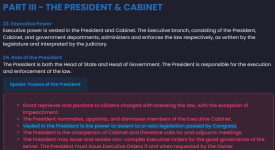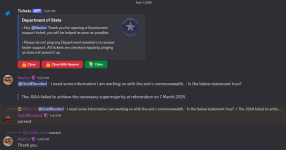Opening Statement
IN THE FEDERAL COURT OF THE COMMONWEALTH OF REDMONT
OPENING STATEMENT
May it please the court,
At the heart of this case is a fundamental constitutional breach - a failure of the Executive to carry out its duty as required by law.
The Judicial Standards Amendment Act was passed by both chambers of the legislature in accordance with every procedural requirement. It did not amend the Constitution. It required no referendum. It awaited only the President’s assent - or veto - within the constitutionally mandated 14-day period. That window came and went without action.
And under the express language of our Constitution, if the President does not act, assent is presumed. By law, the JSAA is in force. And yet the Executive refuses to implement it.
Did the Judicial Standards Amendment Act meet the requirements to become law?
To become law, a non-complex bill must:
1. Pass with a majority in both chambers of Congress
2. Receive Presidential assent.
On 13 February 2025, the Judicial Standards Amendment Act (JSAA) was proposed to amend the Judicial Standards Act.
On or around 25 February 2025, the JSAA was passed by the House of Representatives.
On or around 26 February 2025, the JSAA was passed by the Senate.
The New Constitution of the Commonwealth was enacted on 08 March 2025, and became the governing legal framework.
On 16 March 2025, the President was informed that the JSAA did not require a referendum, as it did not constitute a complex or constitutional change, but rather sought to remove redundant language from the Judicial Standards Act.
The President failed to act on the JSAA within the time frame established by the Constitution, which mandates that assent is automatically presumed to have been given after 14 days.
What type of law was the Judicial Standards Amendment Act?
Prior to 08 March 2025, a complex bill was a bill which met the following:
A complex change includes the following and needs to be discussed with the Owner before being signed by the President:
1. Changes to the System of Government.
2. Plugin-related changes.
3. Changes involving significant staff involvement.
4. A Rights & Freedoms change.
Defining System of Government Changes
Any changes that:
1. Affect the distribution of power between different parts and levels of the state.
2. Changes to Government Departments.
3. Significant changes to the system by which the state is governed in general.
The Judicial Standards Amendment Act simply
did none of these things, it only amended itself to remove sections made redundant by the new Constitution.
The passage of the Judicial Standards Amendment Act was tied to the passage of the Commonwealth of Redmont Constitution Act.
(2) This Act shall be enacted immediately upon its signage and is contingent to the Commonwealth of Redmont Constitution Act's passage.
Meaning, any and all complex changes were appropriately included, and voted on, in the Commonwealth of Redmont Constitution Act referendum. As a result, the Judicial Standards Amendment Act could never be considered a complex change as all it did was remove duplicate law which was already included in the Constitution.
Did the Judicial Standards Amendment Act amend the Constitution?
No, it did not. So not only was it a non-complex change prior to 08 March 2025, it did no amend the Constitution post 08 March 2025. These are the only two triggers for a referendum - so why was one held?
Why was a referendum was held?
The Defence argues that a referendum was held because:
The JSAA removed the establishment of what a district is, as the JSA at that time defined that "Each town or city shall be considered a district",
Wrong. This does not constitute a referendum or complex change. The new Constitution changed this, not the JSAA.
The requirements for Judicial Officers in the old Constitution was only of total playtime, while in the JSAA it is total playtime + playtime in the last 30 days.
Wrong. This does not constitute a referendum or complex change. The new Constitution changed this, not the JSAA.
If you are suggesting that there is a clash between the JSAA and the Constitution, then the JSAA is only more redundant as the new Constitution supersedes the requirements of the JSAA.
| JSAA/Old Constitution | New Constitution |
The following requirements exist in order to be nominated to the bench:
Chief Justice - has accrued 150 hours and 12 hours of playtime in the last 30 days
Justice - has accrued 125 hours and 12 hours of playtime in the last 30 days
Judge - has accrued 72 hours and 12 hours of playtime in the last 30 days | (3) Qualifications for nomination:
(a) Chief Justice: 150 hours of total active playtime.
(b) Justice: 125 hours of total active playtime.
(c) Judge: 72 hours of total active playtime.
Makes JSA requirements redundant by superseding them. |
The JSAA establishes Appeal requirements that I can't find in the old Constitution.
Wrong. This does not constitute a referendum or complex change. The JSAA also only removes.
As demonstrated, neither complex change nor constitutional change necessitated a referendum per the new and old Constitution.
Wrong. The executor act here is the new constitution. The JSAA only executes it's sections on the condition that the new constitution passes. It cannot possibly amend a constitutional law, because it cannot execute until the new constitution removes the constitutionality of the JSA. This change is purely administrative to remove a redundant section.
The premise is simple here, ask how can the JSAA possibly have amended the constitution? It couldn't have because it's passage was contingent to the act that amended the constitution and made the sections that the JSAA removes from the JSA redundant.
Is Ex-Post Facto Relevant?
The argument that
ex post facto protections allow the Executive to ignore constitutional obligations that arose
under the previous constitution is flawed for clear legal and logical reasons.
Ex post facto prevents punishing past conduct under new
criminal laws. The law expressly says this and the defence clearly does not understand this legal concept. However, lets just entertain the Defence's logic and say that it does apply.
The new Constitution was already in effect when the President became obligated to act. There is no retroactive application - it’s a failure to comply with a duty in the present, under the law that applied at that time.
Frankly, this argument is a misdirection to mask incompetence and a failure to act.
(4) Ex-Post Facto (Original: Pacman - May 26, 2020)
(a) Individuals cannot be subject to punishments for criminal actions if it was not illegal at the time it was committed.
(b) Any legislation that has passed after a lawsuit has been filed, will not be considered in that lawsuit, nor in the appeal of that lawsuit and the case that takes place if the appeal for that lawsuit has been accepted. Congress may override Ex-Post Facto through a bill, however such a bill will require supermajority in both chambers.
A
BILL
To
Establish a Criminal Code
The people of the Commonwealth of Redmont, through their elected Representatives in the Congress and the force of law ordained to that Congress by the people through the constitution, do hereby enact the following provisions into law:
1 - Short Title and Enactment
(1) This Act may be cited as the ‘Standardized Criminal Code Act'
(2) This Act shall be enacted immediately upon its signage.
(3) This Act has been authored by: The_Donuticus
(4) This Act has been co-sponsored by: VanillaChai79
2 - Reasons
Our criminal...
An act passed under the old Constitution doesn’t vanish just because the new Constitution alters procedure.
If a bill was passed, and the new Constitution came into effect before executive action, then the next procedural step must comply with the new Constitution.
As you can see, this is not an ex post facto problem.
Constitutional Authority
I encourage the Defence to review their legal notes - a constitution, as the highest legal document, overrides any law which conflicts with it.
Plaintiff: Where a statute conflicts with the Constitution, does the constitution or statute prevail?
Defence: The existing statute is enforceable until it is properly amended and or removed.
The court can see the Defence doesn't understand Constitutional authority.
The fluff removal act is completely irrelevant here. The new constitution passed into law on 08 March 2025 and the 14 days after, the JSAA became law on or around 24 March 2025.
The Fluff Removal Act, an act of Congress that the plaintiff drafted, removed the 14-day time period requiring presidents to sign bills within the allotted time. The act specifies, ‘Vested in the President is the power to assent to or veto legislation passed by Congress.’ This provides clarity that no such timeframe is required by the constitution for the president to provide their assent or veto.
The President had the power to act under either framework - old and new. Choosing inaction is not a neutral act - especially when the new Constitution specifically defines inaction as assent.
The 14 day automatic assent requirement is not legal in this sense and non-enforceable for actions pre-dating the new constitution.
Saying the 14-day rule doesn’t apply because the bill passed earlier is like saying you can keep driving with an expired license because you started the trip before it expired... it’s absurd.
The reality here is that the duty arose well after the new constitution became the highest legal governing framework. This is a procedural matter.
I invite the Defence to rest their case to save us all the time of trying to defend an illegal action.
I seeks what the law already provides:
– Recognition that the JSAA is now valid law,
– A declaration that the President’s inaction amounted to a failure to discharge a constitutional duty, and
– A writ of mandamus compelling the Executive to implement the JSAA without further delay.
This Court has both the authority and the responsibility to reaffirm that no office is above the constitutional framework that gives it power.
The rule of law demands no less.
If the Executive can ignore constitutional timelines without consequence, then our entire legislative process becomes optional — and the Constitution little more than a suggestion.
If a bill can pass both chambers, meet every legal threshold, and still be ignored by the President - then what is the point of a Constitution?








